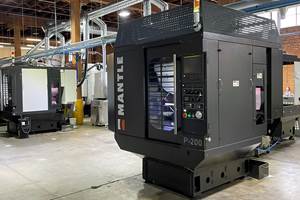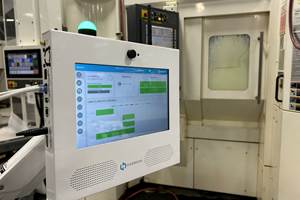Hiring, Training and Supporting the Workforce in School and on the Job
Virginia’s Rolls-Royce Crosspointe plant shares its strategies for attracting, hiring and supporting its workers, while Danville Community College excels with its integrated machining education model.
Share





A recurring topic of discussion during my recent trip touring Virginian manufacturing facilities was labor: finding it, hiring it, training it. For some manufacturers, the local reality is that there are not enough already-skilled people looking for work. Hiring under these circumstances entails offering access to technical education of some kind, or a lot of on-the-job training. On the other hand, some other manufacturers have been able to partner with local higher-education institutions in order to establish “pipelines” of people with the skills necessary to begin work with less additional training.
On-the-Job Training
Rolls-Royce Crosspointe’s model is taking advantage of both routes. The aerospace manufacturer has some aggressive short-term hiring goals: hire another 36 people by the end of 2017, 50 more in 2018.
That’s not going to be easy. Manufacturing Executive Lorin Sodell says that a skilled workforce represents one of Crosspointe’s biggest challenges of late. He says the plant ultimately hires about one resume out of every hundred. Despite the difficulties inherent in this process, the company is doing some interesting things to stay engaged with the potential labor pool and to encourage ongoing education and advancement for its existing employees:
- Biweekly assessments: The recruitment process at Rolls-Royce has multiple steps, culminating in biweekly assessments of as many as 12 applicants at a time. Rather than a competitive environment, Mr. Sodell says that the day-long assessment is a space for applicants to relax and “be themselves.” Candidates get an overview of the factory and an employee-led tour of shop operations. Then they are interviewed with a focus on “soft skills,” such as how they’ve responded in certain situations in current and former working roles, and how they plan and organize their work. After a casual lunch, a group exercise assesses how comfortable the candidates are in communicating ideas and working as a team. “Their experience and education is typically what get them in the door,” says Mr. Sodell, “but it’s their personality and behavior that will allow them to succeed at the Assessment Center.” He adds that this process has enabled Crosspointe to attract people with widely diverse personalities and work styles.
- Apprenticeships: Crosspointe participates in an accredited apprenticeship program organized through the Community College Workforce Alliance (CCWA), a regional partnership out of John Tyler Community College. Mr. Sodell says that new hires at Crosspointe often join the apprenticeship program.
- Secondment and cross training: Mr. Sodell explains that when Crosspointe started each of its factories, initial hires didn’t have the necessary skills or experience to excel. With that understanding, these hires completed a “secondment” (a model more common to European employers), traveling to sister plants in the United Kingdom to imbed with more experienced colleagues for up to six months. Those who completed this program were then able to train additional hires back in Virginia. Within Crosspointe, employees are encouraged to cross-train in other areas of the shop in order to obtain additional skills certifications. The secondment approach of detaching from one’s usual milieu to learn from colleagues over several months gives employees a chance to branch out and provides obvious long-term value to Rolls-Royce.
- Boarding: Rolls-Royce aims to have clearly defined “ladders” for employees to advance in responsibility and compensation. Arranged by skillset (for example, CNC machining, non-destructive testing, inspection, etc.), each advancement path has internally published criteria that employees can follow. “We purposely do not put any minimum or maximum timeframes on when an employee can or should progress,” Mr. Sodell says. “In this way, there are neither ‘entitlements’ nor capacity controls on the number of people who can progress.” One avenue for advancement revolves around employees’ initiative to acquire new skills and challenge themselves. Twice per year, Mr. Sodell explains, Crosspointe opens “boarding windows” during which an employee assembles and submits an “evidence pack” and demonstrates before a three-person panel that they have mastered certain requisite skills. The panel works to accommodate the individual style and approach of each of these projects to see what people are capable of. “The standards are high, but so is the success rate,” he says.
- Partnerships with schools: According to Mr. Sodell, Rolls-Royce has been recruiting from area community colleges and high schools since 2011, “and the relationships get stronger every year.” Paid internships for high school students usually lead to full-time offers when they graduate. Additionally, the community colleges have invited Rolls-Royce to review and make suggestions on their curricula multiple times, ensuring that graduates meet manufacturers’ needs.
The company’s support for its employees to cross-train, continually learn and demonstrate their skills by rewarding creative problem solving contribute to what seems to be a vibrant and diverse labor culture at the plant.
Building Paths from Schools to Skilled Jobs
One of the organizations Rolls-Royce Crosspointe collaborates with for skilled labor is the Gene Haas Center for Integrated Machining. The center was built on the campus of the Institute for Advanced Learning and Research (IALR) in Danville, Virginia, and offers an impressive Integrated Machining Technology (IMT) lab for training in partnership with Danville Community College (DCC).
Troy Simpson, director of advanced manufacturing at DCC, presented on the regional capacity of the college’s machining programs, which include dual-enrollment programs in high schools as well as community college and IALR-based programs. These programs provide aligned curricula enabling high school students to earn a machining degree in one year. So far, the high school machining program has enjoyed a 99-percent pass rate, and all the programs together are projected to produce some 270 precision machining graduates per year.
The community college offers a two-year Precision Machining Technology program aligned to NIMS level II standards and a third-year Integrated Machining Technology “capstone” program in the IALR Gene Haas Center, which replicates a real-world production cell to teach students lean principles, process optimization, leadership principles and manufacturing economics to NIMS level III standards. Additionally, DCC offers a Dimensional Inspection metrology program taking advantage of the Gene Haas Center’s separate metrology lab, teaching students how to inspect precision components based on geometric dimensioning and tolerancing (GD&T) principles, how to operate and program coordinate measuring machines (CMMs), and how to conduct bench inspections. The program certifies students as ASQ Certified Quality Inspectors (CQIs).
In the future, Mr. Simpson says that DCC intends to add new technologies to its educational programs, such as additive manufacturing and data-driven manufacturing.
A number of OEMs are involved with DCC’s efforts, including Sandvik Coromant, Haas, Renishaw, Autodesk, Mitutoyo, Master Gage & Tool, Rolls-Royce and BWX Technologies. Kyocera SGS Precision Tools has begun building a new technology and R&D center (a “Tech Hub”) right across from the IALR campus. Jason Wells, chief technical officer with Kyocera SGS, says that often the company has to hire engineers from wherever they are available and then relocate them to where they’re needed (such as the Tech Hub to be built in Virginia). But with DCC’s programs in full swing, he says they actually have “too many to choose from.”
Related Content
In Moldmaking, Mantle Process Addresses Lead Time and Talent Pool
A new process delivered through what looks like a standard machining center promises to streamline machining of injection mold cores and cavities and even answer the declining availability of toolmakers.
Read MoreCan Connecting ERP to Machine Tool Monitoring Address the Workforce Challenge?
It can if RFID tags are added. Here is how this startup sees a local Internet of Things aiding CNC machine shops.
Read MoreInside Machineosaurus: Unique Job Shop with Dinosaur-Named CNC Machines, Four-Day Workweek & High-Precision Machining
Take a tour of Machineosaurus, a Massachusetts machine shop where every CNC machine is named after a dinosaur!
Read MoreHow I Made It: Amy Skrzypczak, CNC Machinist, Westminster Tool
At just 28 years old, Amy Skrzypczak is already logging her ninth year as a CNC machinist. While during high school Skrzypczak may not have guessed that she’d soon be running an electrical discharge machining (EDM) department, after attending her local community college she found a home among the “misfits” at Westminster Tool. Today, she oversees the company’s wire EDM operations and feels grateful to have avoided more well-worn career paths.
Read MoreRead Next
Setting Up the Building Blocks for a Digital Factory
Woodward Inc. spent over a year developing an API to connect machines to its digital factory. Caron Engineering’s MiConnect has cut most of this process while also granting the shop greater access to machine information.
Read MoreRegistration Now Open for the Precision Machining Technology Show (PMTS) 2025
The precision machining industry’s premier event returns to Cleveland, OH, April 1-3.
Read MoreBuilding Out a Foundation for Student Machinists
Autodesk and Haas have teamed up to produce an introductory course for students that covers the basics of CAD, CAM and CNC while providing them with a portfolio part.
Read More
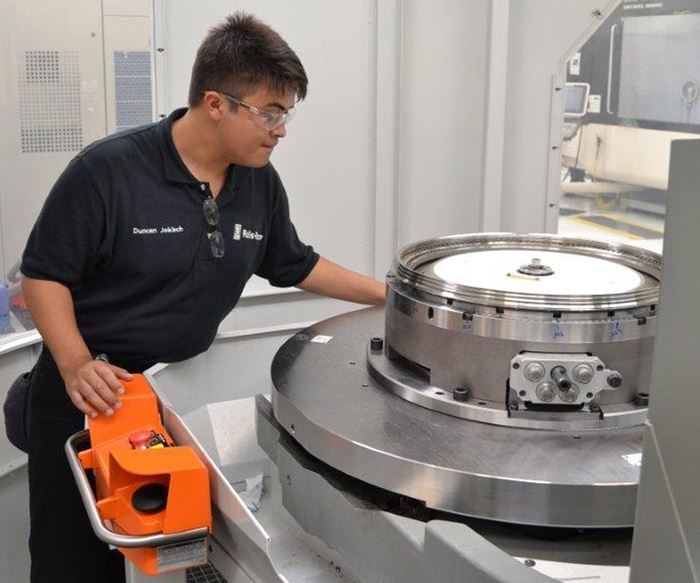
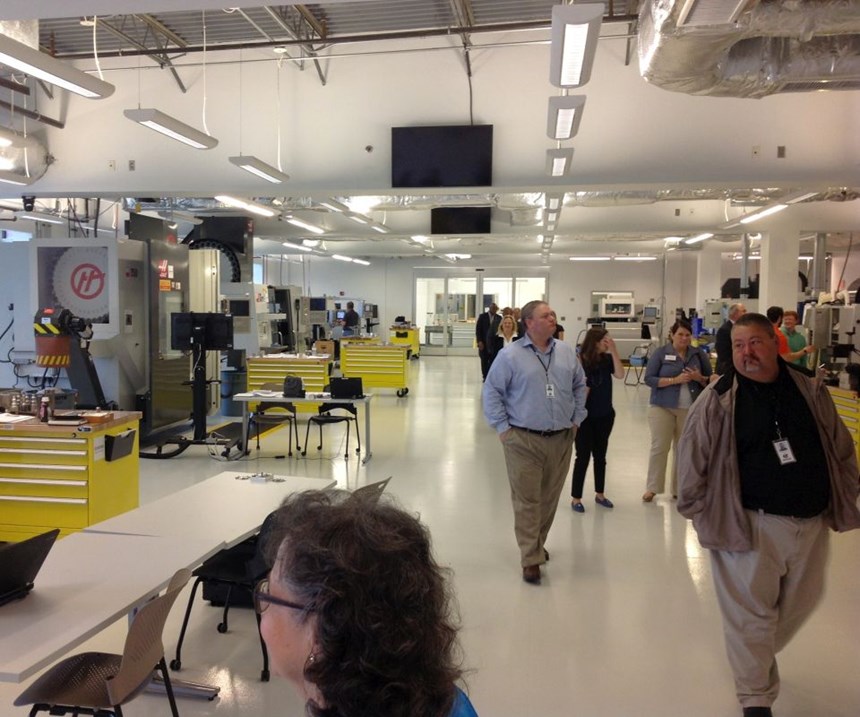
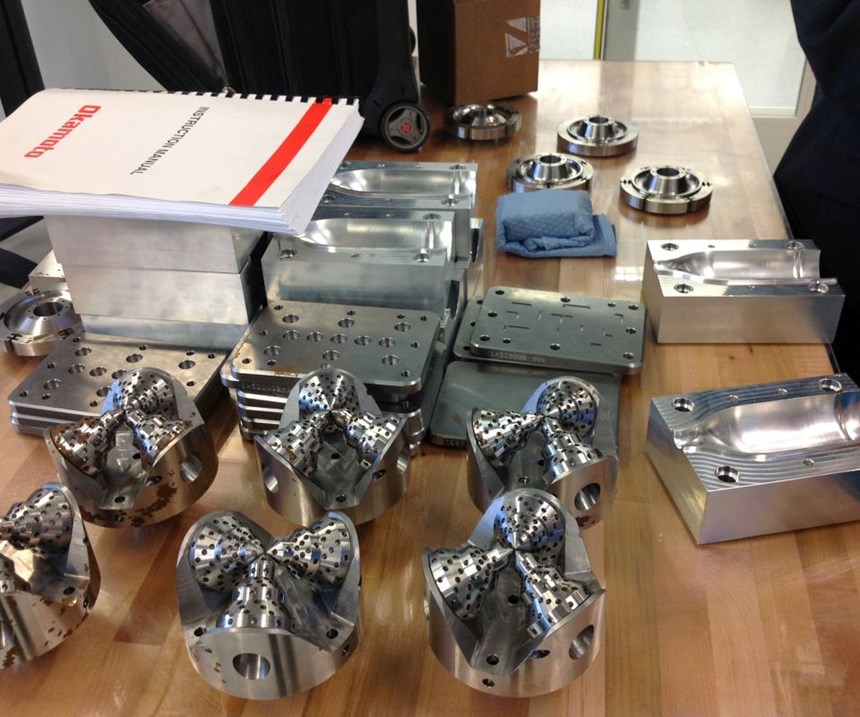



















.jpg;maxWidth=300;quality=90)


